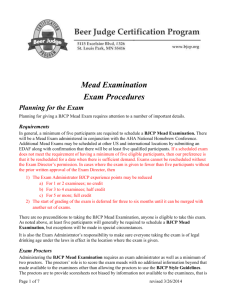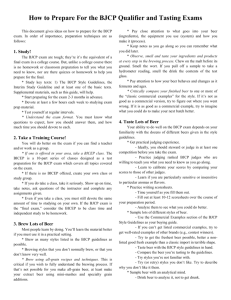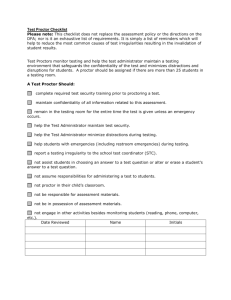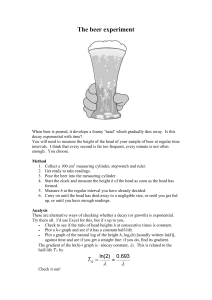Exam Procedures
advertisement
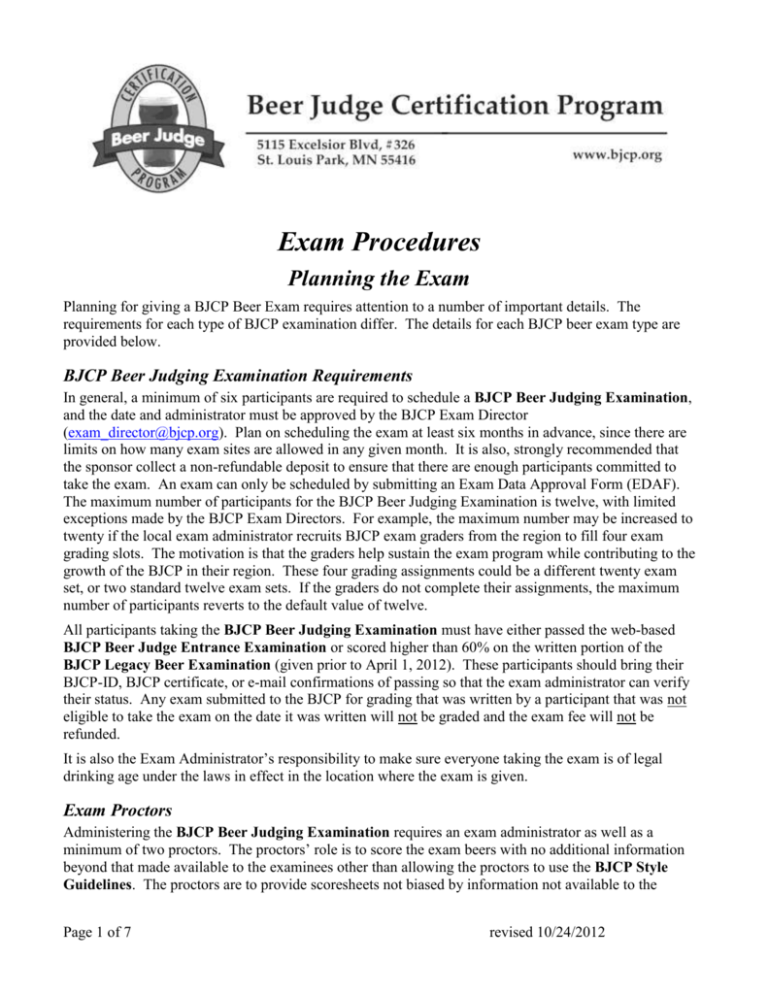
Exam Procedures Planning the Exam Planning for giving a BJCP Beer Exam requires attention to a number of important details. The requirements for each type of BJCP examination differ. The details for each BJCP beer exam type are provided below. BJCP Beer Judging Examination Requirements In general, a minimum of six participants are required to schedule a BJCP Beer Judging Examination, and the date and administrator must be approved by the BJCP Exam Director (exam_director@bjcp.org). Plan on scheduling the exam at least six months in advance, since there are limits on how many exam sites are allowed in any given month. It is also, strongly recommended that the sponsor collect a non-refundable deposit to ensure that there are enough participants committed to take the exam. An exam can only be scheduled by submitting an Exam Data Approval Form (EDAF). The maximum number of participants for the BJCP Beer Judging Examination is twelve, with limited exceptions made by the BJCP Exam Directors. For example, the maximum number may be increased to twenty if the local exam administrator recruits BJCP exam graders from the region to fill four exam grading slots. The motivation is that the graders help sustain the exam program while contributing to the growth of the BJCP in their region. These four grading assignments could be a different twenty exam set, or two standard twelve exam sets. If the graders do not complete their assignments, the maximum number of participants reverts to the default value of twelve. All participants taking the BJCP Beer Judging Examination must have either passed the web-based BJCP Beer Judge Entrance Examination or scored higher than 60% on the written portion of the BJCP Legacy Beer Examination (given prior to April 1, 2012). These participants should bring their BJCP-ID, BJCP certificate, or e-mail confirmations of passing so that the exam administrator can verify their status. Any exam submitted to the BJCP for grading that was written by a participant that was not eligible to take the exam on the date it was written will not be graded and the exam fee will not be refunded. It is also the Exam Administrator’s responsibility to make sure everyone taking the exam is of legal drinking age under the laws in effect in the location where the exam is given. Exam Proctors Administering the BJCP Beer Judging Examination requires an exam administrator as well as a minimum of two proctors. The proctors’ role is to score the exam beers with no additional information beyond that made available to the examinees other than allowing the proctors to use the BJCP Style Guidelines. The proctors are to provide scoresheets not biased by information not available to the Page 1 of 7 revised 10/24/2012 examinees, that is why the exam administer does not also function as a proctor – the exam administrator selects/prepares the exam beers and generally knows too much about the beers. Grading tasting examinations requires high quality proctor score sheets. To ensure this, the proctors must come from a pre-approved proctor list drawn from the pool of “active” National and Master judges found on the BJCP web site in the pages at http://www.bjcp.org/apps/reports/proctors.php . This page is dynamically generated when the BJCP database of judge scores and experience is updated. If the administrator for an exam administration site is not able to obtain proctors from this list, they MUST contact the Exam Director at least two weeks prior to the exam to get advance approval to use alternative proctors. The BJCP Exam Director (exam_director@bjcp.org) can grant waivers from the proctor rules but such exceptions are expected to be rare. The use of a proctor with less than National-level rank, including the use of judges with minimum tasting score of 80 and more than 10 judging experience points requires pre-approval by the Exam Director. We further desire that at least one proctor be a Master-level judge (or higher) or a judge with a minimum tasting score of 90 and with at least 20 judging experience points. If one or more of the proctors is Master-level, then a third proctor can be used that only has a Certifiedlevel rank. Potential proctors must be identified when scheduling a BJCP Beer Judging Examination. The Exam Director can grant waivers to the proctor requirements, but these waivers are expected to be limited to examinations outside of North America and to areas with very few existing BJCP judges. Such waivers must be coordinated with the Exam Director before scheduling the examination. Travel Expenses Each exam proctor earns one judging experience point and five Grand Master Service Requirement (GMSR) credits for his or her efforts, and this is generally sufficient to balance expenses associated with traveling to the exam. The exam administrator is allocated 30% of the exam fees for expenses associated with the exam, and a portion of this can be used to subsidize the proctors’ travel expenses. However, in special cases, such as when the exam is in a remote location or there are a large number of examinees, the BJCP Board of Directors may grant stipends to cover higher than normal administrative and travel expenses. Requests for these stipends must be made to the Exam Director at least three months prior to the exam date, and the requests are limited to reasonable and actual expenses, such as one night in a hotel, gasoline, or translation fees. Scanned copies of receipts should be submitted to the exam director after the exam, and reimbursement will be made by the BJCP treasurer (preferably through PayPal). BJCP Beer Judge Written Proficiency Examination In general, a minimum of six participants are required to schedule a BJCP Written Proficiency Examination, however the majority of the Written Proficiency Exams in the United States will be regional exams administered annually. These exam sites for 2013 are listed below and were selected based on the number of qualified judges, the number of exams administered in 2010-2012, and the number of exams scheduled in 2012 and 2013. In addition, there will be a Written Proficiency Exam administered in conjunction with the AHA National Homebrew Conference. Additional Written Proficiency Exams may be scheduled at other US and international locations by submitting an EDAF along with confirmation that there will be at least six qualified participants. All participants taking the BJCP Beer Judge Written Proficiency Examination must have achieved a score of at least 80% on either the BJCP Beer Judging Examination or on the tasting portion of the BJCP Legacy Beer Examination and they must have amassed at least 10 BJCP judging points. If the Page 2 of 7 revised 10/24/2012 exam administrator is uncertain about the credentials of the written exam candidate, he or she should request approval from the BJCP Exam Director (exam_director@bjcp.org). There will be no exceptions to these rules. Any exam submitted to the BJCP for grading that was written by a participant that was not eligible to take the exam on the date it was written will not be graded and the exam fee will not be refunded. As noted above, at least six participants will generally be required to schedule a BJCP Beer Judge Written Proficiency Examination, but exceptions will be made in special circumstances. The regional Written Proficiency Exam sites for 2013 are: Seattle, San Francisco/Sacramento, San Diego/Los Angeles, Denver/Boulder, Houston (Dixie Cup), Minneapolis, Chicago/Milwaukee/Madison, Plymouth(MI)/Ann Arbor, Rochester/Buffalo, Philadelphia (NHC), and Charlotte/Raleigh. Please check the online exam calendar for specific dates. Exam Fees The fees for the BJCP Beer Judging Examination are US $40 for first time takers and $15 for subsequent retakes. The fee for the BJCP Beer Judge Written Proficiency Examination is $15. Thirty percent of the fee for each exam is designated for expenses related to holding the exam, and may be split between the sponsor and administrator. If there are to be additional expenses such as room rentals or transportation, please get approval from the exam director prior to the exam, and send receipts to the exam director for reimbursement. The sponsor or administrator, at their discretion, may reduce individual exam fees by waiving a portion of their allotment. This is acceptable as long as the BJCP receives $28 (70% of $40) or $10.50 (70% of $15) for each participant. Examinees should pay the Exam Administrator (if using checks, make them out directly to the Exam Administrator). The Exam Administrator then submits the payment using PayPal directly to the BJCP for 70% of total fees. No cash or checks, please. The payment system is at http://www.bjcp.org/apps/exam_pay/exam_find.php. The PayPal system is for Exam Administrators only; do not advertise this link to examinees. Before the Exam Exam Papers for All Examinations Approximately two weeks before the exam, you will be sent the exam questions (if a written exam will be administered), the participant information form (PIF), beer scoresheets (judging exam) and other documents that are needed for the exam. You will need to make copies of these forms for each exam taker. On the PIF, please place sequential numbers (1, 2, 3, etc.) after the four digit, four letter exam code (e.g., 1204-CALA) to identify the examinees. This ensures anonymity throughout the grading process. The exams will be copied before they are sent to the graders, so please use standard size (8.5 by 11) ruled paper and instruct the participants to write on only one side and to NOT write in the margins – the originals need to be photocopied for the graders and copy machines tend not to copy all the way to the edges of the original. The exam director will also provide a lined answer sheet template that may be used if ruled paper is not available. Exam Beers for the BJCP Beer Judging Examination You will need six beers for the judging portion of the exam, with sufficient volume of each for all examinees and proctors. A good rule of thumb is 3-4 oz. per sample. It is strongly recommended that these beers be homebrews and represent a reasonable cross section of mainstream classic beer styles. Page 3 of 7 revised 10/24/2012 Leftover beers from homebrew competitions are excellent sources of beers for a BJCP exam, and beers from similar styles can often be blended to make a unique sample. Do not use specialty, fruit or herb beers (do not use BJCP styles 16E, 20, 21A, 21B, 22B, 22C, or 23). The six exam beers must be unique styles; multiple versions of the same style shall not be used in an exam, e.g., you cannot present two different examples of a Dry Stout. Up to three classic-style commercial beers may be used if sufficient suitable examples of homebrewed beer are not available, but these selections should be communicated to the exam director (exam_director@bjcp.org) in advance of the exam. When using classic-style commercial examples, insure that the brands chosen actually do reasonably represent the style named on the label. Two of the beers should have distinctly noticeable faults or characteristics (avoid threshold flavor faults/characteristics including mildly stale examples), such as the examples in this list: diacetyl/buttery; DMS/cooked vegetable; oxidized/cardboard; lactic or acetic acid sourness; green apple/acetaldehyde; fruitiness/esters; solvent-like/higher alcohols; puckering/astringent; grossly incorrect body, alcohol content, color or other style characteristics. Naturally flawed beers or blends of different homebrewed beers are strongly preferred. Doctoring beers to obtain these characteristics is discouraged due to variable results, but if there is no alternative, the doctoring procedures outlines in Section II.E of the BJCP Study Guide should be used. The base beers being doctored should not be clean light lagers, as in a flavor training class, but more common styles such pale ales, German lagers or dark ales. One of the beers should be an excellent (38-44) or outstanding (45-50) example of its style. In order to ensure that the proctors and examinees are judging the same beer, the beers should be blended and decanted from a pitcher. Each beer should be served to the participants under optimum temperature conditions. Avoid delays between decanting beers and serving. Announce each beer style and sub-style as it is served but provide no additional information. Strive to serve beers in the following categories – both lagers and ales, light and dark beers, and both low and high gravity styles, for example: 1. 2. 3. 4. 5. 6. Lager (BJCP styles 1-5) Hybrid or German Wheat (BJCP styles 6, 7, 15) English or American Ale (BJCP styles 8, 10) Dark ales (BJCP styles 9, 11-13) Belgian (BJCP styles 16-18) IPA and Strong (BJCP styles 14, 19) A specific example of a suite of exams beers is as follows: 1. 2. 3. 4. 5. 6. English Pale Ale – flaw such as incipient oxidation and weak hop aroma German Weizen - good example, but with slightly too much sourness Doppelbock – no flaws, outstanding example Belgian Saison – somewhat flawed, with higher than desirable phenols or alcohol Imperial Stout – very good example, but lacks smoothness found in best examples American IPA – seriously flawed with fruitiness, astringency or diacetyl Page 4 of 7 revised 10/24/2012 While only one hypothetical suite of beers, these cover a range of styles, colors, strengths and quality. The appropriate range in scores likely spans the low teens to the mid-40s. It is encouraged to discuss your ideas for exam beers with the Exam Director prior to the exam. The proctors’ scoresheets will be the basis of comparison for the graders’ evaluation of the examinees. Proctors must be served each beer with only the same information as provided to the test takers. It is highly recommended that the Exam Administrator refrain from preparing scoresheets if he or she also prepares and serves the test beers. This may introduce bias into the scoring since the exam administrator knows more about the source of the beers than the participants. If you are unable to obtain two suitable proctors that have no knowledge of the beers please contact the Exam Director for help in producing exam beers that you will be unfamiliar with so you can score them. Note that we are now using expanded scoresheets for the proctors and are asking them to refrain from discussion until after they finish their scoring and comments on the scoresheet – at that time they are to complete the consensus sheet for the beer but are not to alter their original scoresheets. Provide information to the Exam Director about each beer served using the following template: 1. 2. 3. 4. 5. 6. Style of beer as brewed, entered in competition or marketed. Identify as homebrewed, or brand of beer if commercial example Draft or bottled If bottled, conditioned or counter pressure filled Approximate age (freshness) of beer (if known) Distinctive fault(s) or characteristic(s), e.g., contaminated, diacetyl, esters, oxidation, distinctive hop aroma/flavor, body, alcohol, etc. 7. Comments on blending, doctoring, adjusting, whatever that might impact the perception of the beer. 8. Any other notes that might be useful for the graders, such as expected scoring range or why the beer was chosen for the exam. During the Exam Format The BJCP Beer Judging and Beer Judge Written Proficiency Examinations both have 90-minute time limits, but many exams will only offer the judging portion. If there are any participants taking the written exam, it should be administered first, with a 15-30 minute break before the commencement of the judging exam. Those participants only taking the judging exam should be respectfully quiet if they arrive while the written exam is being administered. The beers in the judging exam should be served at 15 minute intervals. The scoresheets for the tasting examination should not be passed out for the essay examination. A typical schedule is: 9:00: Written exam begins 10:30: Written exam concludes, with answer sheets collected 10:30-10:55: Participants arrive for judging exam 11:00: Judging exam begins 12:30: Judging exam concludes, with scoresheets collected Exam Checklist 1. Copies of the PI form for all examinees, the proctors, and yourself. 2. Copies of the exam cover sheet. 3. Judging exam: Copies of the examinee and proctor scoresheets. Page 5 of 7 revised 10/24/2012 4. Written exam: Copies of the exam questions. 5. Sufficient supply of standard size (8.5. by 11), ruled paper – preferably not three-hole punched loose-leaf paper, since it tends to jam in copy machines. If this is not available, the exam director can provide a lined template that can be used to generate answer sheets. 6. Judging Exam: Exam beers, bottle opener, pitcher and cups. 7. Judging Exam: Water and bread to cleanse the palate. 8. Mechanical pencils. At the Start of the Exam, Please Explain that: The written and judging exams are both closed book, so the BJCP Style Guidelines and other references cannot be used. Most essay questions can be answered in about 1.5 to 2 pages. If the participants are writing significantly more or less, adjustments may be made. Partial credit is given for incomplete answers, so instruct the participants not to skip any questions. The exam requires advance payment. Offer a refund to anyone who is not prepared, but only before the exam has been distributed. Examinees need to legibly complete the participant information form. It is otherwise difficult to return the results. Examinees must place their examinee codes on all exam papers and write on only one side of the answer sheets. The six test beers should be evaluated as if the prospective judges were participating in a BJCP competition. They will be graded on completeness, descriptive ability, perception, feedback and scoring accuracy. Use of Electronic Devices Use of the following electronic devices is not allowed during the BJCP examinations: Calculators, except for basic “four-function” models. By “four-function” we mean basic calculators that do not have the ability to store programs or data for redisplay. Pagers PDAs Laptop or desktop computers. Cell phones. In the case of an emergency, phones may be left with the Administrator with instructions for answering. Walkman/iPod or other listening devices. Headphones of any type. Examinees with any special needs are required to contact the Exam Director to work out specific procedures a minimum of 6 weeks in advance of the exam date. PI Forms should also be completed by the proctors, and even by you the exam administrator. We have found that this gives us another means of collecting address changes for some judges. Results: When the grading has been completed, the official results and a report to the participant will be mailed to the examinees as soon as the exam information has been entered into the BJCP database. The judging record will list the competitions in which the each participant has judged. There are often omissions, but instructions will be provided on how to bring the judging records up-to-date. In keeping with the BJCP Privacy Policy, the exam scores are not released to the Exam Administrator. Page 6 of 7 revised 10/24/2012 After the Exam Copy the exams: The exam administrator is responsible for making a complete copy of the exams, proctor sheets, exam beer notes and PI forms—every page must be copied. The exam administrator should retain the copies until the BJCP Exam Director confirms that the originals have been received. If this confirmation is not received within two weeks, contact the Exam Director to confirm – exams have been lost in the mail before. The administrator should then provide a copy of their individual exam to each of the examinees. This copy is the only copy that will be made available to the examinees. Under no circumstances will the BJCP be returning the originals or copies of the exams. The cost of making this copy is expected to be covered by the 30% of the exam fee allotted for the administration of the exam. Scoring and Turnaround Time: Exams should be mailed to the exam director as soon as possible after the exam date, but no later than one week after the test. It is anticipated that the exam results will be returned within sixteen to twenty weeks of the exam date. Approximately half of this time is used by volunteer National and higher ranked judges to do the comprehensive scoring of the exams. Their scoring and feedback is then reviewed by both an Associate Exam Director and the Exam Director before being sent to the Assistant Exam Director for processing and recording of the results. Experience Points: You will receive Exam Administrator experience as ten GMSR points (see http://www.bjcp.org/gmsr.php for the details) which in turn results in two non-judging experience points. You are permitted to delegate some or all of these experience points to those who assist with the exam, but at present no additional points will be given for these supporting roles. As noted above, additional judging experience points are available to proctors who serve as independent tasters of the exam beers. They are to evaluate the beers with only the same information as that given the examinees – namely the style in question. They are not to consult and resolve scoring discrepancies. The proctors should be informed that their scoresheets will be evaluated by the graders and director for quality, and points may not be awarded if the proctors’ work is substandard. Similarly, some or all of the administrator’s points may not be awarded if it is apparent that these instructions were not followed, or the exams are not received within ten days of the exam date. Page 7 of 7 revised 10/24/2012
